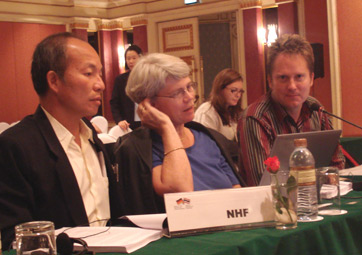The Codex Committee on Nutrition and Foods for Special Dietary Uses met in Thailand in the week ending on 3 November2006. As has routinely been the case in past meetings in Germany, big food and big pharma were given the red carpet, while consumer interests came in a very distant third.
The National Health Federation (NHF), which despite its name is an international consumer-oriented non governmental organization accredited with Codex, reports on the meeting under the headline: Codex Puts Industry Interests Before Consumers - Again!
The NHF delegation at Chiang Mai was led by Ingrid Franzon from Sweden. Also on the NHF's delegation were Dr Wong Ang Peng from Malaysia and Dr Robert Verkerk, from the UK.

From left: Dr. Wong Ang Peng, Ingrid Franzon, Dr. Robert Verkerk
The NHF team stimulated some two hours of discussion following its intervention over the need to stipulate more detailed specifications for 'safe water' to which infant formula is added. Safe water is a concept not well understood by many parents who use infant formula, and contamination continues to result in millions of cases of infant death and sickness annually. Interestingly, the Chairman attempted to shut down the discussion following the NHF intervention by saying, 'Safe, more safe, most safe, what is the difference?' but fortunately the International Baby Food Action Network (IBFAN), the International Association of Consumer Food Organizations (IACFO) and other INGOs, who were also more concerned with consumer interests, fought hard to reach a compromise on wording in the face of strong opposition from national delegations, who, seemingly, primarily voiced the views of industry.
In an apparent attempt to head off criticism and to allow the restrictive European regulations to take foot before advancing international discussions, the controversial issues of food supplements and health related information on foods were - again, as in previous years - put late on the agenda and given little time for consideration.
Free trade is being increasingly used to bypass national legislation on the way to globalization of our food supply. With Canada, Mexico and the US being fused into a huge free trade zone, this trend, which started with Europe, is being accentuated. Here is the NHF's take how this may influence the relatively liberal situation for healthy foods in the US:
...the outcome of this meeting underscores yet again the importance of all freedom loving individuals, especially Americans, of opposing the creation of so-called "free trade areas" and regional blocs, such as the proposed North American Union.